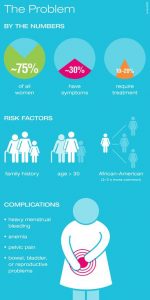
By Jake Ford, 2016 Communications Intern
In recognition of Women’s History Month, we at the UNC Center for Health Promotion and Disease Prevention will be posting a weekly tribute to the work done by and for women as part of the Women in Science Wednesday initiative by UNC Research. Our activities will include featuring projects that focus on benefitting the lives of women in our community as well as featuring the accomplished women researchers here at HPDP that lead efforts in promoting community health.
 Uterine Fibroids affect ¾ women, and disproportionately affect African-American women, but not much is known about what causes fibroids or the best way to manage fibroids.
Uterine Fibroids affect ¾ women, and disproportionately affect African-American women, but not much is known about what causes fibroids or the best way to manage fibroids.
COMPARE-UF is a study to determine the effectiveness of different surgical and medical management options for uterine fibroids in women across the lifespan (ages 18-54). To help achieve this objective, researchers will create a multi-center (9 US centers) registry of geographically, racially, ethnically, and clinically diverse group of women with uterine fibroids. The University of North Carolina at Chapel Hill is one of these 9 clinical sites participating in this landmark study. Our goal is to reach women throughout the state of North Carolina that have been affected by uterine fibroids.
The UNC study is led by principal investigator Wanda Nicholson. Aditi Sundaresan, a COMPARE-UF Research Assistant, has been focusing on recruitment of participants in the study. “After spending hours and hours on the phone with these women and surveying them about their feelings and experiences surrounding fibroids, it’s so clear that this is a major problem and truly affects a woman’s quality of life,” Sundaresen said.
The study is purely observational and will collect information from women before and after treatment about how the treatment affected their uterine fibroid symptoms. This information will be compared nationally, used to provide answers to women’s questions about treatment options, and lead to improved care for patients with uterine fibroids now and in the future.
Participant Laura Maddux spoke on her motivations to work with COMPARE-UF, “I’m participating in this study because I want to help find answers to the problems that have been so troubling to me,” Maddux said. “It’s been frustrating that so little is known about what causes uterine fibroids, yet they are so common. I also want to encourage other women to talk about what is often an unspoken problem.”
The study has enrolled 24 women for COMPARE-UF so far. Women who may qualify are:
- Women with symptomatic fibroids
- Between the ages of 18-54
- Primarily English speaking
- Scheduled for a surgical procedure (myomectomies, endometrial ablations, uterine artery embolizations, and MRI focused ultrasounds)
Sundaresan commented, “Fibroids cross all disciplines of women’s health and the doctors I work with are excited to see the results of the study as well. It’ll definitely affect what treatment options they recommend to patients in the future.”
